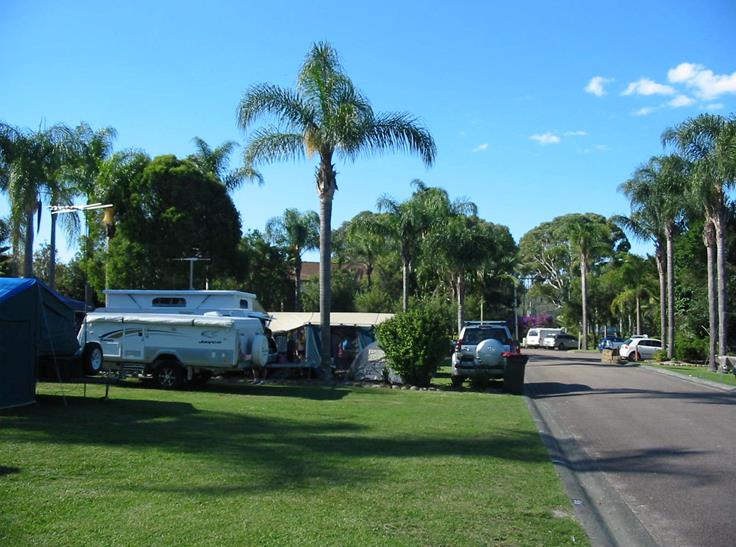BIG4 Karuah Jetty's Caravanning and Camping Tips
These tips and tricks are a great start to getting you from where you are now, to enjoying your time with us at our lovely park! Of course you can always give us a call, we love holidays and are happy to help make your next great break one to remember.

1. Make a checklist
You’ll need a comprehensive array of items when holidaying with a caravan. Obviously a towing aid is required, but you need to select one that is right for your vehicle.
Other essential caravanning items include a fire extinguisher, wheel chocks, caravan jack, sway control device, towing mirrors, extra coolant and oil, a spare fan belt, and insulation tape.
As with any hobby, some items are essential for newbies, while others can be purchased over time for extra comfort and convenience.
2. Ensure your van is safe and secure
Once armed with the essentials, you’ll need to make sure your caravan (and vehicle) is safe to be on the open road. It’s best to write a checklist well before you depart and keep it within your caravan for easy referral.
Among necessary checks are that the towing aid is fitted correctly, drawers and other loose items are secure, and windows and doors are locked. Also, remove wheel chocks and the jockey wheel (or secure it), and raise the caravan’s steps. It is also essential that the lights of both your vehicle and caravan are operational and all tyres are inflated correctly.
3. Take it easy
No doubt you’ve been stuck behind a slow-moving caravan. Now it’s your turn to irritate other motorists! Naturally, towing something the size of a bloated elephant takes getting used to – and you should take extra care anyway – yet there is another important consideration: fuel consumption. Travelling at high speed drains your vehicle’s fuel as it is, let alone when you are towing a caravan. And it’s even more pronounced when driving into the wind.
If towing a caravan at a reduced speed, be mindful of traffic behind you, and use slow vehicle turnouts where possible.
When on the road, other important tips for caravanners include avoiding the desire to swerve if wildlife strays onto the road and being aware of side winds caused by large vehicles.
Don’t be too hard on the accelerator; for the sake of safety and fuel economy.
4. Have an early start
Following on from the tip above, it pays to rise early and hit the road before the crowds join the party. This is especially so when towing a caravan for the first time, as you’ll feel much more confident driving in light traffic.
5. Be prepared for confined spaces
No matter the strength of your relationship, a caravanning trip can be a test for you and your partner. One of the top tips for caravanning is to be prepared for the fact that you will be travelling in confined surrounds. Give each other space, where allowable.
Give each other space, as the confines of a caravan can test relationships.
6. Work as a team
When it comes to tips for using a caravan for the first time, one of the biggest of all is how to reverse the darn thing. Practice makes perfect: put in training runs before facing an audience at your BIG4 park.
When at your site, choose the shortest path necessary for reversing (if you want to challenge yourself on holidays, bring along a Rubik’s cube). From here, parking a caravan requires you to work as a team. Ensure you and your partner’s communication is sound and you can hear each other loud and clear. However, consider using hand signals – or even two-way radios – as it might be difficult to hear instructions over a loud engine. Use your mirrors, be patient, and don’t panic.
Reversing a caravan requires teamwork if it’s to be a success.
7. Have a set-up routine
If you’ve spent considerable time on the road, the last thing you’ll want to do is spend hours setting up your site. Once again, a practice run is worthwhile, as the process will become more efficient over time.
As each caravan differs, so too does the setting-up process. However, here’s a brief rundown: start by unhitching the caravan, putting on its handbrake, and clearing your vehicle away. Once done, level the caravan, lower all four corner steadies until they are touching the ground, set up the gas and water systems, and connect the power. From here, head inside the caravan and check the power and water supplies: heating, taps, oven, fridge, etc.
8. Don’t take opinions as gospel
Having a rig makes you a target to cop advice of fellow caravanners, and there’s every chance you’ll be hit with more opinions than a talkback radio host. In no time, you’ll be informed about the best bakery, the cheapest beer, and alternative routes that are ‘so much quicker’. Simply nod and smile.
9. Pack up properly
For this tip, it’s best to refer to point number three: follow your checklist. However, there will be additional factors to consider, such as turning off the gas, disconnecting electrics, and removing water and waste water supplies.
10. Take a course
If you’re serious about caravanning you should do it properly. While they might seem excessive, the various ‘caravanning for beginners’ courses on offer will provide great theoretical and practical advice, and boost your confidence. Alternatively, arrange for a caravan specialist to check your rig before you set off.
At the very least, have a trial run with your caravan before beginning an epic journey. It’s important to familiarise yourself with your new ‘home away from home’.





